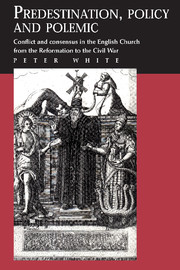 Predestination, Policy and Polemic
Predestination, Policy and Polemic If contemporary fears of Arminianism were focussed on Montagu rather than on the court, they were not limited to him. The name most often coupled with his was that of Thomas Jackson. The author of an unsigned manuscript dating from c. 1630 entitled ‘Reasons for the suppressing of Arminianism in the Church of England’ was shaken by Montagu's elevation to Chichester, but took comfort from King Charles's friendly reception of Carleton's book against him, from the Declaration prefixed, but most of all from the proclamation suppressing the Appello Caesarem. He nevertheless considered the publication in 1628 of Thomas Jackson's A Treatise of the Divine Essence and Attributes more dangerous than anything of either Montagu or Arminius.
The title of Jackson's book was reminiscent of the notorious volume of Vorstius condemned by King James. Unlike Montagu, however, Jackson was well known, even Prynne granted, as ‘a man of great abilities, and of a plausible, affable, courteous deportment’. He was ‘no way a friend to the Church of Rome’. The combination of plausibility and profundity, it was feared, would ‘entangle many, who cannot so easily get out of his nets again’. Jackson had dared to state publicly, in his dedication to the Earl of Pembroke, that he knew he would be taken for an Arminian. In the highly charged atmosphere of 1628, that was a self-fulfilling prophecy.
What makes Jackson deserve more than a passing mention is that, in spite of his undoubted links with Durham House, in personality and outlook he was quite different from Neile himself and from other members of his circle.
To save this book to your Kindle, first ensure no-reply@cambridge.org is added to your Approved Personal Document E-mail List under your Personal Document Settings on the Manage Your Content and Devices page of your Amazon account. Then enter the ‘name’ part of your Kindle email address below. Find out more about saving to your Kindle.
Note you can select to save to either the @free.kindle.com or @kindle.com variations. ‘@free.kindle.com’ emails are free but can only be saved to your device when it is connected to wi-fi. ‘@kindle.com’ emails can be delivered even when you are not connected to wi-fi, but note that service fees apply.
Find out more about the Kindle Personal Document Service.
To save content items to your account, please confirm that you agree to abide by our usage policies. If this is the first time you use this feature, you will be asked to authorise Cambridge Core to connect with your account. Find out more about saving content to Dropbox.
To save content items to your account, please confirm that you agree to abide by our usage policies. If this is the first time you use this feature, you will be asked to authorise Cambridge Core to connect with your account. Find out more about saving content to Google Drive.